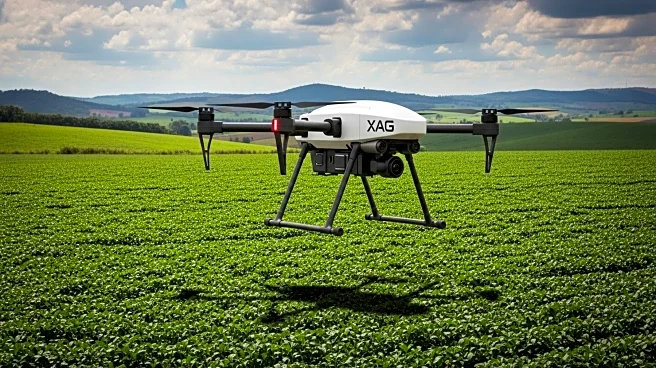What's Happening?
Brazilian farmers are increasingly adopting agricultural drones to address challenges posed by unpredictable weather and labor shortages. XAG drones offer practical solutions by saving time, reducing waste, and providing flexibility in crop management. The drones enable farmers to quickly adjust to changing weather conditions, improving efficiency and crop health. Bruno Oliveira, a farmer in Minas Gerais, has successfully integrated XAG drones into his operations, achieving more uniform crop coverage and reducing water usage. The drones' autonomous operation and precision technology have proven ideal for navigating challenging landscapes and minimizing crop damage.
Why It's Important?
The use of agricultural drones represents a significant advancement in farming technology, particularly in regions like Brazil where climate unpredictability poses challenges to traditional farming methods. By enhancing efficiency and precision in crop management, drones help farmers optimize resource use and improve yields. The ability to quickly adapt to weather changes and reduce labor costs is crucial for maintaining productivity and profitability. As Brazil moves towards more sustainable agricultural practices, the adoption of drone technology is expected to play a key role in achieving these goals.
What's Next?
The continued adoption of agricultural drones in Brazil is likely to drive further innovation and investment in drone technology. As farmers experience the benefits of drones, there will be opportunities for expanding their use to other crops and regions. The introduction of new models, such as the XAG P150, with enhanced capabilities, will further support farmers in optimizing their operations. Collaboration between technology providers and agricultural stakeholders will be essential to ensuring the successful integration of drones into farming practices.
Beyond the Headlines
The shift towards drone technology in agriculture raises important considerations regarding training and skill development. Farmers will need to acquire new skills to effectively operate and maintain drones, which may require investment in education and support services. Additionally, the environmental impact of increased drone usage, such as energy consumption and electronic waste, must be carefully managed to ensure sustainable development. Addressing these challenges will be crucial to maximizing the benefits of drone technology in agriculture.









